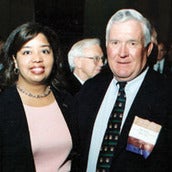
This issue of the ACC Docket is dedicated in honor of one of ACC’s founders, Donald P. Walsh, who passed away on May 18, 2017, at the age of 87. Don served as vice president and general counsel of Sunoco (then, Sun Company, Inc.) from 1980 until his retirement in 1992. He was a visionary executive who contributed to the evolution of the role of the general counsel from that of a purely legal advisor and gatekeeper to a strategic partner to the business, and he did so through leadership and example — spawning an in-house counsel revolution1 that resulted in today’s 21st century chief legal officer.
As I recall my early days in the Sunoco law department, Don was the quintessential role model for today’s general counsel. About 37 years ago, he reported directly to Sunoco’s CEO from an office only a few feet away. Don was a respected advisor with a voice in shaping corporate strategies and key business decisions. He built a relationship of trust with the board of directors, participated in every board meeting, and tapped strong interpersonal skills and emotional intelligence to navigate the politics of the C-suite and work effectively with other executives. Don was also compensated commensurately with the value he brought, consistently being listed among the five highest-compensated corporate officers. The leadership credibility that Don brought to his job inured to the benefit of the lawyers in his department, and we were similarly well respected as hard-working contributors to the success of the company.
Also, it’s thanks to Don’s innovative commitment to hiring and grooming new lawyers fresh out of law school that I joined the Sunoco law department in 1986, became an ACC member, and have been part of the in-house counsel community all my professional life.
According to the ACC Chief Legal Officers 2017 Survey, more than one in five general counsel report that they are not members of the executive team, and about 28 percent do not report to the CEO. Further, more than 30 percent do not have regular access to the board of directors. These statistics are particularly disturbing because I have personally experienced the difference it makes when the general counsel has an unquestioned seat at the table — both with the chief executive and the board. This is why I am enthusiastically working with the ACC board of directors and global staff to lead an advocacy effort we’re calling “The Seat at the Table” initiative with the intent that it be multi-year and global in scope.
The basic principal underlying this ACC initiative is that setting the right corporate cultural “tone from the top,” necessitates the CEO and board of directors signaling to the rest of the company that compliance with laws and regulations is a corporate priority and their leadership vision entails making ethics and integrity a consistent priority. Given the importance of the general counsel in matters of ethics, compliance, corporate governance, and risk and reputation management, it would seem obvious that the general counsel must be a key ally and partner in establishing a culture that supports corporate performance and growth, without compromising ethical behavior. This is not possible when the company’s top lawyer is not included in strategic discussions with a standing seat at the table.
But claiming and keeping that seat at the table means doing your work to be prepared to meaningfully contribute. There are several professional development opportunities, including ACC’s Business Education for In-house Counsel programs through Boston University, as well as the upcoming ACC Law Department Leadership 2.0 program in Montreal, Quebec. This career-focused issue may also inspire your professional growth and influence, with articles on leadership and more, as well as insights from GCs who’ve made the move to the head of the executive table as CEO.
1 This evolution is discussed in the book, The In-House Counsel Revolution, authored by Ben W. Heineman, Jr., who served as general counsel and senior vice president of law and public affairs at General Electric from 1987 until his retirement in 2005.



